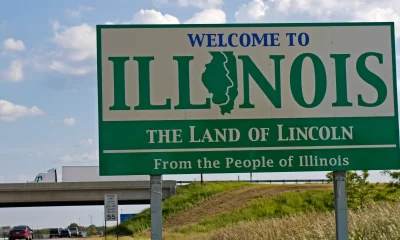Business
U.S. Lawmakers File Bill To Ease Federal Employment Restrictions On Cannabis Use

A new bill would prevent past and current cannabis use from being the sole grounds for denial of federal employment or a security clearance.
A bipartisan pair of U.S. lawmakers last week introduced legislation to ease federal employment restrictions on cannabis use that deny employment opportunities for past and current marijuana users. The bill, titled the Cannabis Users Restoration of Eligibility (CURE) Act, was introduced on July 27 by Democratic Representative Jamie Raskin of Maryland and Representative Nancy Mace, a Republican from South Carolina who has been an outspoken supporter of federal cannabis policy reform.
“Every year, qualified and dedicated individuals seeking to serve our country are unable to secure federal jobs and security clearances because the federal government has not caught up with the widely established legal use of medical and recreational cannabis,” Raskin said in a statement on Friday. “I am proud to partner with my friend Representative Mace to introduce the bipartisan CURE Act that will eliminate the draconian, failed and obsolete marijuana policies that prevent talented individuals from becoming honorable public servants in their own government.”
If passed, the CURE Act would prevent past or current marijuana use from being the basis for an applicant being found unsuitable for federal employment or the denial of a security clearance for federal workers. The legislation would also be applied retroactively, allowing workers or applicants who have been denied employment or a security clearance to appeal such denials.
“For too long, the federal government has been denying Americans civil service opportunities solely because of its outdated attitudes toward cannabis and those who consume it,” said Morgan Fox, political director at the cannabis policy reform group the National Organization for the Reform of Marijuana Laws (NORML). “Denying these millions of Americans consideration for employment and security clearances is discriminatory and it unnecessarily shrinks the talent pool available for these important jobs. NORML commends the sponsors for working to undo this policy and replace it with fair and sensible hiring and clearance practices that will put America on much stronger footing on the global stage.”
Bill Endorsed By Justice Groups
The CURE Act has been endorsed by justice reform advocates and cannabis industry groups including the Drug Policy Alliance, the Due Process Institute, Law Enforcement Action Partnership (LEAP), NORML and the U.S. Cannabis Council.
“Millions of patriotic, conscientious Americans use cannabis legally each year, but they are consistently penalized by outdated federal regulations,” said Ed Conklin, executive director of the U.S. Cannabis Council. “We strongly support the CURE Act because it will bring federal employment policies into line with the views of most Americans. Cannabis use should never prevent a qualified candidate from serving his or her country as a federal employee.”
The bipartisan bill is not the first effort to ease employment discrimination against cannabis users seeking a job with the federal government. In 2021, the federal Office of Personnel Management, an agency that sets “suitability” standards to determine whether an individual is fit to serve in a federal position, issued new guidance to clarify that past marijuana use should not automatically disqualify applicants or appointees from most U.S. government jobs. However, the agency emphasized that marijuana is still considered a Schedule I substance under the Controlled Substances Act. Additionally, the Drug-Free Workplace executive order of 1986 requires federal employees to refrain from using illegal drugs at all times.
“An individual’s disregard of federal law pertaining to marijuana while employed by the federal government remains relevant and may lead to disciplinary action,” the OPM wrote in the 2021 memo. “It is important to note that it is also the policy of the federal government to offer appropriate prevention, treatment and rehabilitation programs and services for federal civilian employees with drug problems.”
Also in 2021, the Office of the Director of National Intelligence, which sets security standards for access to classified information, issued new guidance to clarify that past marijuana use should not be the sole reason someone is denied a security clearance. The guidance stresses that the illegal use of any controlled substances “can raise security concerns about an individual’s reliability and trustworthiness to access classified information or to hold a sensitive position, as well as their ability or willingness to comply with laws, rules, and regulations.”
However, the guidelines also instruct agencies that prior recreational marijuana use by an individual “may be relevant to adjudications but not determinative” in issuing a security clearance. The guidance references a 2017 security directive that tells agencies to apply the “whole person concept” to the decision for granting a security clearance.
“There are many talented and dedicated people who have used cannabis and want to serve their country,” said Terry Blevins, a former civilian investigator for the Department of Defense, Arizona police sergeant, and LEAP board member. “Compromising recruitment by our federal agencies with antiquated cannabis laws makes our nation less safe in the face of security threats we face globally.”
Business
New Mexico cannabis operator fined, loses license for alleged BioTrack fraud

New Mexico regulators fined a cannabis operator nearly $300,000 and revoked its license after the company allegedly created fake reports in the state’s traceability software.
The New Mexico Cannabis Control Division (CCD) accused marijuana manufacturer and retailer Golden Roots of 11 violations, according to Albuquerque Business First.
Golden Roots operates the The Cannabis Revolution Dispensary.
The majority of the violations are related to the Albuquerque company’s improper use of BioTrack, which has been New Mexico’s track-and-trace vendor since 2015.
The CCD alleges Golden Roots reported marijuana production only two months after it had received its vertically integrated license, according to Albuquerque Business First.
Because cannabis takes longer than two months to be cultivated, the CCD was suspicious of the report.
After inspecting the company’s premises, the CCD alleged Golden Roots reported cultivation, transportation and sales in BioTrack but wasn’t able to provide officers who inspected the site evidence that the operator was cultivating cannabis.
In April, the CCD revoked Golden Roots’ license and issued a $10,000 fine, according to the news outlet.
The company requested a hearing, which the regulator scheduled for Sept. 1.
At the hearing, the CCD testified that the company’s dried-cannabis weights in BioTrack were suspicious because they didn’t seem to accurately reflect how much weight marijuana loses as it dries.
Company employees also poorly accounted for why they were making adjustments in the system of up to 24 pounds of cannabis, making comments such as “bad” or “mistake” in the software, Albuquerque Business First reported.
Golden Roots was fined $298,972.05 – the amount regulators allege the company made selling products that weren’t properly accounted for in BioTrack.
The CCD has been cracking down on cannabis operators accused of selling products procured from out-of-state or not grown legally:
- Regulators alleged in August that Albuquerque dispensary Sawmill Sweet Leaf sold out-of-state products and didn’t have a license for extraction.
- Paradise Exotics Distro lost its license in July after regulators alleged the company sold products made in California.
Golden Roots was the first alleged rulebreaker in New Mexico to be asked to pay a large fine.
Source: https://mjbizdaily.com/new-mexico-cannabis-operator-fined-loses-license-for-alleged-biotrack-fraud/
Business
Marijuana companies suing US attorney general in federal prohibition challenge

Four marijuana companies, including a multistate operator, have filed a lawsuit against U.S. Attorney General Merrick Garland in which they allege the federal MJ prohibition under the Controlled Substances Act is no longer constitutional.
According to the complaint, filed Thursday in U.S. District Court in Massachusetts, retailer Canna Provisions, Treevit delivery service CEO Gyasi Sellers, cultivator Wiseacre Farm and MSO Verano Holdings Corp. are all harmed by “the federal government’s unconstitutional ban on cultivating, manufacturing, distributing, or possessing intrastate marijuana.”
Verano is headquartered in Chicago but has operations in Massachusetts; the other three operators are based in Massachusetts.
The lawsuit seeks a ruling that the “Controlled Substances Act is unconstitutional as applied to the intrastate cultivation, manufacture, possession, and distribution of marijuana pursuant to state law.”
The companies want the case to go before the U.S. Supreme Court.
They hired prominent law firm Boies Schiller Flexner to represent them.
The New York-based firm’s principal is David Boies, whose former clients include Microsoft, former presidential candidate Al Gore and Elizabeth Holmes’ disgraced startup Theranos.
Similar challenges to the federal Controlled Substances Act (CSA) have failed.
One such challenge led to a landmark Supreme Court decision in 2005.
In Gonzalez vs. Raich, the highest court in the United States ruled in a 6-3 decision that the commerce clause of the U.S. Constitution gave Congress the power to outlaw marijuana federally, even though state laws allow the cultivation and sale of cannabis.
In the 18 years since that ruling, 23 states and the District of Columbia have legalized adult-use marijuana and the federal government has allowed a multibillion-dollar cannabis industry to thrive.
Since both Congress and the U.S. Department of Justice, currently headed by Garland, have declined to intervene in state-licensed marijuana markets, the key facts that led to the Supreme Court’s 2005 ruling “no longer apply,” Boies said in a statement Thursday.
“The Supreme Court has since made clear that the federal government lacks the authority to regulate purely intrastate commerce,” Boies said.
“Moreover, the facts on which those precedents are based are no longer true.”
Verano President Darren Weiss said in a statement the company is “prepared to bring this case all the way to the Supreme Court in order to align federal law with how Congress has acted for years.”
While the Biden administration’s push to reschedule marijuana would help solve marijuana operators’ federal tax woes, neither rescheduling nor modest Congressional reforms such as the SAFER Banking Act “solve the fundamental issue,” Weiss added.
“The application of the CSA to lawful state-run cannabis business is an unconstitutional overreach on state sovereignty that has led to decades of harm, failed businesses, lost jobs, and unsafe working conditions.”
Business
Alabama to make another attempt Dec. 1 to award medical cannabis licenses

Alabama regulators are targeting Dec. 1 to award the first batch of medical cannabis business licenses after the agency’s first two attempts were scrapped because of scoring errors and litigation.
The first licenses will be awarded to individual cultivators, delivery providers, processors, dispensaries and state testing labs, according to the Alabama Medical Cannabis Commission (AMCC).
Then, on Dec. 12, the AMCC will award licenses for vertically integrated operations, a designation set primarily for multistate operators.
Licenses are expected to be handed out 28 days after they have been awarded, so MMJ production could begin in early January, according to the Alabama Daily News.
That means MMJ products could be available for patients around early March, an AMCC spokesperson told the media outlet.
Regulators initially awarded 21 business licenses in June, only to void them after applicants alleged inconsistencies with how the applications were scored.
Then, in August, the state awarded 24 different licenses – 19 went to June recipients – only to reverse themselves again and scratch those licenses after spurned applicants filed lawsuits.
A state judge dismissed a lawsuit filed by Chicago-based MSO Verano Holdings Corp., but another lawsuit is pending.
Source: https://mjbizdaily.com/alabama-plans-to-award-medical-cannabis-licenses-dec-1/
-

 Business2 years ago
Business2 years agoPot Odor Does Not Justify Probable Cause for Vehicle Searches, Minnesota Court Affirms
-

 Business2 years ago
Business2 years agoNew Mexico cannabis operator fined, loses license for alleged BioTrack fraud
-

 Business2 years ago
Business2 years agoAlabama to make another attempt Dec. 1 to award medical cannabis licenses
-

 Business2 years ago
Business2 years agoWashington State Pays Out $9.4 Million in Refunds Relating to Drug Convictions
-

 Business2 years ago
Business2 years agoMarijuana companies suing US attorney general in federal prohibition challenge
-

 Business2 years ago
Business2 years agoLegal Marijuana Handed A Nothing Burger From NY State
-

 Business2 years ago
Business2 years agoCan Cannabis Help Seasonal Depression
-

 Blogs2 years ago
Blogs2 years agoCannabis Art Is Flourishing On Etsy













